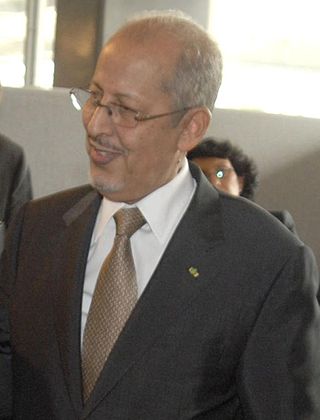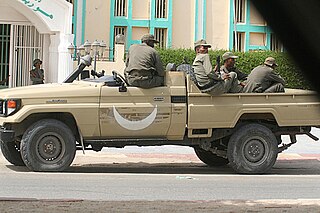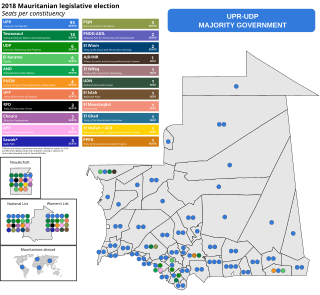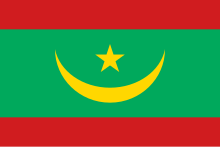
The first fully democratic Presidential election since 1960 occurred on 11 March 2007. The election was the final transfer from military to civilian rule following the military coup in 2005. This was the first time the president was selected by ballot in the country's history. The election was won by Sidi Ould Cheikh Abdallahi, who was ousted by a military coup in 2008 and replaced by general Mohamed Ould Abdel Aziz.

The flag of Mauritania is a green field containing a gold star and crescent, with two red stripes at the top and bottom of the field. The original national flag was introduced under the instructions of President Moktar Ould Daddah and the constitution of 22 March 1959 and was adopted on 1 April 1959.

Colonel Ely Ould Mohamed Vall was a Mauritanian political and military figure. Following a coup d'état in August 2005, he served as the transitional military leader of Mauritania until 19 April 2007, when he relinquished power to an elected government.

Presidential elections were held in Mauritania on 11 March 2007. As no candidate received a majority of the votes, a second round was held on 25 March between the top two candidates, Sidi Ould Cheikh Abdallahi and Ahmed Ould Daddah. Abdallahi won the second round with about 53% of the vote and took office in April.

Sidi Mohamed Ould Cheikh Abdallahi was a Mauritanian politician who was President of Mauritania from 2007 to 2008. He served in the government during the 1970s, and after a long period of absence from politics he won the March 2007 presidential election, taking office on 19 April 2007. He was deposed in a military coup d'état on 6 August 2008.
In December 1984, Haidallah was deposed by Colonel Maaouya Ould Sid'Ahmed Taya, who, while retaining tight military control, relaxed the political climate. Ould Taya moderated Mauritania's previous pro-Algerian stance, and re-established ties with Morocco during the late 1980s. He deepened these ties during the late 1990s and early 2000s as part of Mauritania's drive to attract support from Western states and Western-aligned Arab states. Mauritania has not rescinded its recognition of Polisario's Western Saharan exile government, and remains on good terms with Algeria. Its position on the Western Sahara conflict has been, since the 1980s, one of strict neutrality.

The 2008 Mauritanian coup d'état was a military coup that took place in Mauritania on August 6, 2008, when President Sidi Ould Cheikh Abdallahi was ousted from power by the Armed Forces of Mauritania, led by a group of high-ranking generals he had dismissed from office earlier that day.

Mohamed Ould Abdel Aziz is a former Mauritanian politician who was the 8th President of Mauritania, in office from 2009 to 2019. A career soldier and high-ranking officer, he was a leading figure in the August 2005 coup that deposed President Maaouya Ould Sid'Ahmed Taya, and in August 2008 he led another coup, which toppled President Sidi Ould Cheikh Abdallahi. Following the 2008 coup, Abdel Aziz became President of the High Council of State as part of what was described as a political transition leading to a new election. He resigned from that post in April 2009 in order to stand as a candidate in the July 2009 presidential election, which he won. He was sworn in on 5 August 2009. He was subsequently re-elected in 2014, then did not seek re-election in 2019. He was succeeded by Mohamed Ould Ghazouani, who assumed office on 1 August 2019.

Mauritania, officially the Islamic Republic of Mauritania, is a sovereign country in Northwest Africa. It is bordered by the Atlantic Ocean to the west, Western Sahara to the north and northwest, Algeria to the northeast, Mali to the east and southeast, and Senegal to the southwest. Mauritania is the 11th-largest country in Africa and the 28th-largest in the world, and 90% of its territory is situated in the Sahara. Most of its population of 4.4 million lives in the temperate south of the country, with roughly one-third concentrated in the capital and largest city, Nouakchott, located on the Atlantic coast.
Moulaye Ould Mohamed Laghdaf served as the Prime Minister of Mauritania from August 2008 until August 2014.

Ba Mamadou dit Mbaré was a Mauritanian politician who served as President of the Senate of Mauritania from 2006 until his death. As President of the Senate, he succeeded Mohamed Ould Abdel Aziz as Head of State on 15 April 2009, when Abdel Aziz resigned to take part in the June 2009 presidential election. Abdel Aziz was then elected president and in turn succeeded Mbaré on 5 August 2009.

The Union for the Republic was a political party in Mauritania. The party was formed in 2009 by Mohamed Ould Abdel Aziz after he resigned from the military, to run for President of Mauritania. Aziz resigned as chairman of the party on 2 August 2009 after winning the presidential election, as the President of Mauritania cannot be a member of any party. The party also won 13 of the 17 seats up for re-election to the Mauritanian Senate in 2009, giving the UPR control of a total of 38 of the 53 Senate seats.
Yahya Ould Hademine is a Mauritanian engineer and politician who served as Defence Minister of Mauritania. He served as the Prime Minister of Mauritania from August 21, 2014 to October 29, 2018.
The following lists events in the year 2017 in Mauritania.

Parliamentary elections was held in Mauritania in September 2018; the first round took place on 1 September, with a second round held on 15 September. At the national level, elections were held in 157 constituencies, each electing one member to the National Assembly. Elections were also held in 13 regional councils and 219 municipalities.

Mohamed Ould Cheikh Mohamed Ahmed Ould Ghazouani, also known as Ghazouani and Ould Ghazouani, is a Mauritanian politician and retired Mauritanian Army general who is the 9th President of Mauritania, having assumed office on 1 August 2019.

The 2022 Tunisian constitutional referendum was a referendum held on 25 July 2022, organized by the Independent High Authority for Elections to allow the population to decide on a new constitution. The project had the support of the President of the Tunisian Republic, Kais Saied, and the referendum was organized one year after the beginning of the political crisis that began on 25 July 2021 and led to the dismissal of the Mechichi Cabinet and the freezing of the activity of the Assembly of the Representatives of the People, which was dissolved on 30 March 2022 based on Article 72 of the Constitution.

Parliamentary elections will be held in Mauritania on 13 and 27 May 2023, alongside regional and local elections.













